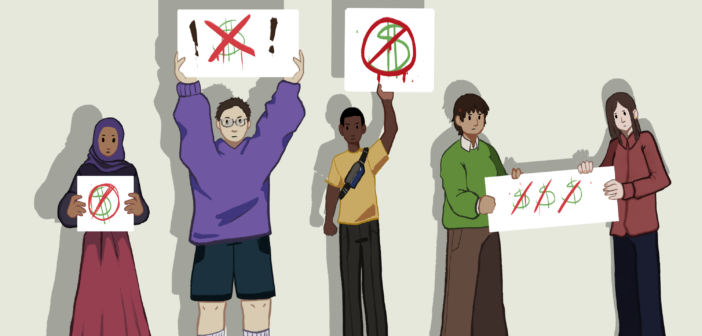On Feb. 28, 2025, the first economic blackout of the year occurred. Organized by The People’s Union USA, the boycotts are targeting larger corporations that rolled back DEI initiatives. Economic blackouts urge people not to spend money for specific reasons depending on who’s coordinating them.
Various retailers notably reversed their DEI initiatives after President Donald Trump signed Executive Order 14151. This order is titled “Ending Radical And Wasteful Government DEI Programs And Preferencing.” Because of this, companies not keeping their DEI programs are being protested.
Economic blackout organizer and phrase explained
John Schwarz founded The People’s Union USA, which is behind the economic blackouts. According to their mission statement on their website, they say, “We are not a political party. We are not a protest. We are a movement of people, organizing to take back control of our economy, government and future of our country.”
Gwendolyn Tedeschi, NCC professor of economics and chairperson of economics & finance, explained what an economic blackout is.
“I would think about it as a boycott,” Tedeschi said. “It’s the idea of not going to a provider who doesn’t align with your goals. People are using the power of their economic choices to really say, ‘This isn’t something we agree with.’ To see companies losing business because of choices they made, it seems like there are consequences.”
Furthermore, social media played a large role in spreading the cause’s awareness, resulting in a multitude of people involving themselves.
National participation
Schwarz took to social media to spread the word about the planned economic blackouts. He uploaded multiple videos leading up to the boycott day and encouraged consumers not to spend money.
In an Instagram Reel posted on the economic blackout day, he explained he wasn’t anticipating numerous Americans to join in.
“This has gone so much further than I ever expected it to,” Schwarz said. “Today is a success in every sense of the word. And we are just getting started.”
NCC student Karina Tapia, ‘26, who uses he/she/they pronouns, is participating in these protests. They explained why boycotts like these matter.
“I think it’s really important that we know the strength of the American dollar and show how we want our money to be spent,” Tapia, ‘26, said. “We can buy from corporations that care about their people and employees.”
They added that the strike against these companies subsequently brought self-reflection, hopefully to others as well.
“I’m sticking to being more aware of where I put my money,” Tapia, ‘26, said. “And just because it might seem like a big situation that I can’t control or I’m not doing enough, it really comes down to putting your money where it counts.”
Economic impacts
New findings have shown that certain companies that scaled back on their DEI initiatives saw a decrease in sales.
According to Retail Brew’s Andrew Adam Newman, “For the week beginning March 10, foot traffic fell 7.1% YoY for Target.” Newman, however, does point out that correlation does not mean causation. But this decline comes close after their DEI reversal announcement.
Conversely, however, corporations that have strongly embraced DEI are seeing a rise in shoppers.
A Numerator report revealed that “In year-to-year visits, Target saw a decline in nearly 5 million shoppers during a four-week period that ended Feb. 9. For Costco, the big-box store corporation saw an increase of 7.7 million visits.”
Additionally, Tedeschi mentioned that some African American parishes in the South had given up Target for Lent. They call it the “40-day Target fast.”
Pastor Jamal Bryant of New Birth Missionary Baptist Church spoke to NPR’s Mary Louise Kelly about his parish’s participation. Moreover, he added that other parishes are joining in, too.
“They’re super excited. There are congregations across the country. And now, they are latching hold and becoming a part of it. Amazingly, 145,000 people have signed up to do the fast with us.”
On the other hand, some thought the Feb. 28 blackout would only see effects on that specific day. In an interview with AP News, Anna Tuchman, a marketing professor at Northwestern University’s Kellogg School of Management, expressed her views.
“I think this is an opportunity for consumers to show that they have a voice on a single day,” Tuchman said. “I think it’s unlikely that we would see long-run sustained decreases in economic activity supported by this boycott.”
Instead of having one day dedicated to not shopping, the People’s Union USA is planning more week-long boycotts. The next boycott scheduled is for Walmart from April 7-14.
Hope for the future
Since many of the boycotted corporations are massive, some may feel discouraged.
“Consumers often don’t think that they really have a voice or have any power whatsoever,” Tedeschi said. “But we are actually seeing a difference.
Nonetheless, with no major holiday shopping season nearby, like Black Friday, many are optimistic that these economic blackouts will work.
“A lot of people say that you have to do all these things in order to have a voice,” Tapia, ‘26, said. “But I feel like that if it happened in the past and things were able to change, and it just took time and dedication, I really do think it’s possible to be heard.”

